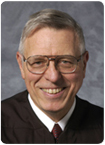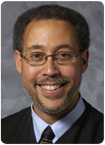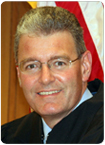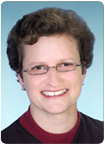2008
Judges trade roles in Judicial Exchange Program
Madison, Wisconsin - December 5, 2008
 |
 |
|
Judge Charles P. Dykman |
Judge Paul B. Higginbotham |
 |
 |
|
Judge John R. Storck |
Judge Shelley Gaylord |
 |
|
|
Judge George S. Curry |
Two Court of Appeals judges and three circuit court judges have been selected to participate in the Wisconsin court system’s Judicial Exchange Program.
Established by Wisconsin Supreme Court Chief Justice Shirley S. Abrahamson in 1996, the program offers judges the opportunity to better understand each others’ roles by allowing them to temporarily trade duties.
Court of Appeals judges learn more about the practices, procedures and problems of the trial courts; trial judges learn more about creating a trial court record that will pass appellate review.
“The Judicial Exchange Program benefits not only the judges who participate, but the entire court system and the people of Wisconsin. The program receives high marks from the judges,” Abrahamson said.
Court of Appeals judges participating in this round of the exchange include Charles P. Dykman and Paul B. Higginbotham, both from District IV Court of Appeals in Madison. Dykman took the bench in Grant and Dodge counties during October and November respectively; Higginbotham is scheduled to take the bench in Rock County later this month.
Circuit court judges participating include George S. Curry, Grant County; Shelley Gaylord, Dane County; and John R. Storck, Dodge County. Gaylord and Storck are screening and reviewing District IV cases this month.
During visits to Madison in October and November, Curry first observed the Court of Appeals’ process, then discussed and helped decide cases with other members of a three-judge panel. Court of Appeals’ work is intense, and much different than what’s experienced by trial-court judges, Curry said.
Trial court judges are nearly always involved in fact-finding work, and most often must rule quickly from the bench. Court of Appeals’ work, on the other hand, involves extensive review of briefs and the standards by which a trial court decision is to be judged, Curry said.
Gaylord said she found observing the Court of Appeals and screening cases both informative and enjoyable.
“It's a good example of the value that comes from discussing a case to share fresh insights and perspectives,” Gaylord said.
Storck, chief judge of the Sixth Judicial District, said he is looking forward to learning the decision making process that is used by the Court of Appeals to reach a final decision in a case.
“As a circuit court judge I make decisions in court on my own without the benefit of input of other judges. The Court of Appeals uses a panel of three judges to screen and decide an appeal. I am looking forward to learning about and participating in the Court of Appeals decision making process that involves multiple judges,” Storck said.
District IV, with five appellate judges, handles appeals from courts in the following counties: Adams, Clark, Columbia, Crawford, Dane, Dodge, Grant, Green, Iowa, Jackson, Jefferson, Juneau, La Crosse, Lafayette, Marquette, Monroe, Portage, Richland, Rock, Sauk, Vernon, Waupaca, Waushara, and Wood.
Like the Supreme Court, the Court of Appeals takes no testimony. Cases are decided based on the trial court record and written briefs and, in a limited number of cases, oral argument. Any person may appeal a final order or judgment of a circuit court to the Court of Appeals.
The Judicial Exchange Program was modeled after a similar program that has operated for years in the federal court system. Federal judges have found their program to be rewarding, but humbling. When U.S. Supreme Court Chief Justice William H. Rehnquist presided over a civil right trial in Richmond, Va. - marking the first time this century that a U.S. Supreme Court justice had presided over a trial - he was reversed on appeal.

